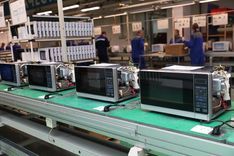Energy efficiency is no longer optional but imperative. In India, appliance manufacturers—many within the MSME framework—face rising energy costs, stricter environmental norms and pressure to remain competitive. Yet, efficiency presents a golden opportunity: cutting costs, enhancing product value, and aligning with global sustainability standards. This article examines why and how MSME appliance makers can embrace energy efficiency, supported by current data, practical steps and real-world examples.
Why energy efficiency matters for appliance manufacturers
For MSME manufacturers of refrigerators, washing machines, water pumps and other appliances, energy efficiency drives value in four areas:
Cost reduction: electricity can account for 20–30 % of production costs in small-scale plants.
Regulatory compliance: energy-intensive industries often require audits and must meet bee or global benchmarks.
Market potential: consumers increasingly seek energy-star-rated appliances.
Environmental responsibility: cutting carbon aligns with India’s commitments under the Paris agreement.
In short, efficiency is both a cost centre saver and a strategic differentiator.
Energy use and potential in MSME clusters
MSMEs consume about 25 % of industrial energy in India, across around 400 energy-intensive clusters. Energy-saving potential ranges from 5 % to 30 %, with estimates suggesting abatement of around 17 million tonnes of CO₂ annually. Beyond cost savings, this represents a significant step towards India’s net-zero ambition—and appliance makers are pivotal given their dual roles as energy consumers and producers of energy-efficient goods.
Appliance manufacturing inefficiencies
Many MSME manufacturers still rely on dated, labour-intensive production systems – inefficient motors, outdated heating processes, minimal insulation, and poor process control (greentree.global). Without modernisation, plants run with inflated energy bills and inconsistent quality. Yet switching to energy-efficient motors, variable speed drives or sensor-driven systems typically achieves 10–20 % savings within two years—well within the payback period.
Policy support and incentive programmes
The Bureau of Energy Efficiency (BEE), under the ministry of power, has rolled out initiatives for MSMEs, including schemes like PAT, ESCO financing and cluster-based interventions (Bureau of Energy Efficiency). The ADEETIE scheme launched in July 2025 offers technical support and interest subvention for advanced technologies. Public-private collaborations—such as BEEUNIDOGEF projects—support bulk procurement of efficient equipment across clusters like ceramic, brass and dairy.
Market transformation through clustered adoption
UNIDOEESLMoSME programmes demonstrate how cluster-based bulk procurement can accelerate adoption and reduce equipment costs. In Surat and Jorhat, standardising on high-efficiency motors and lighting reduced energy costs by 15–25 % within 18 months, while generating local employment and building green supply chains.
Opportunities in appliance manufacturing
Energy efficiency opportunities for MSME appliance makers fall into several categories:
Design innovation: develop appliances with better insulation, energy management systems and efficient compressors.
Manufacturing process upgrades: install variable-speed drives, high-efficiency motors, waste-heat recovery and electric furnaces.
Embedded IoT systems: add sensors and analytics to optimise production in real time—pilot programmes show 18 % energy savings and 15 % improved uptime from smart manufacturing models.
Product labelling: adopt BEE star ratings to enhance market appeal—BEE labels feature on fridges, fans and pumps—the visible promise of lower running costs.
Aligning production efficiency with product energy standards delivers credibility and margin improvements simultaneously.
Challenges facing MSMEs
Despite benefits, several hurdles remain:
Capital intensity: upgrading machinery or installing sensors may require capital that MSMEs lack.
Knowledge deficits: many firms are unaware of the gains from efficient tech.
Fragmented markets: small order sizes reduce bulk purchasing power.
Limited financial support: financing for energy measures remains niche, though growing.
Addressing these requires targeted interventions spanning finance, capacity building and awareness.
Building a strong case for investment
MSME appliance firms can prepare for efficiency upgrades by:
Conducting energy audits to benchmark consumption (BEE stipulates audits for designated consumers).
Calculating ROI: present energy savings versus investment.
Exploring public schemes like PAT, ADEETIE and ESCObased financing.
Joining cluster associations or ESCO alliances to access bulk procurement benefits.
Collectively, these steps help overcome capital and risk hesitancy.




 +91 7208055523
+91 7208055523
 Help & support
Help & support
